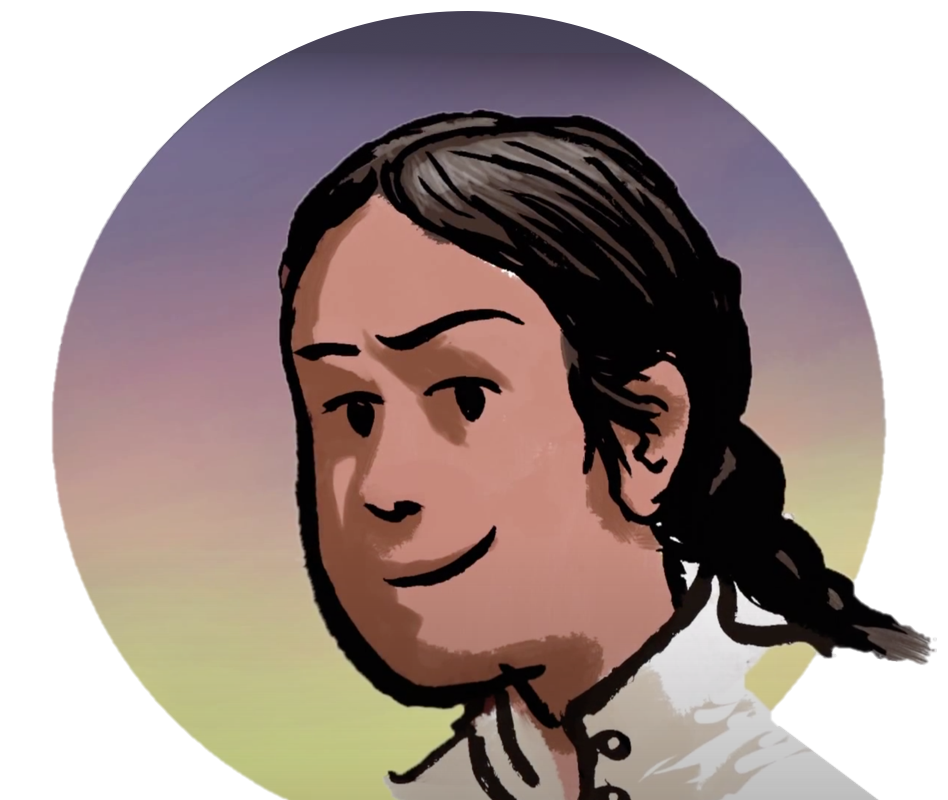Section 5.9 Squamish - ETSÍIM SKW’ESHIMm̓ NA7 TA TEM CHÁYILHEN
Written by: Veselin Jungic and Mark MacLean
Illustrated by: Simon Roy and Jess Pollard
Squamish translation by: X̱elsílem Rivers
An eskwúẏts ta swi7ḵa7ul-Ih Etsim Skw'eshim̓ kwi snas. Ta lam̓s wa na7 ta etsim úxwumixw ch'it ta stakw ask'ekw'ú7 ta chésha7s iy ta mans. Na7 tkwétsi tut t'iḵw natlh na7 ta tem eḵwáyanexw na wa ch'áwatas kwa mans kwis páyaḵentaswit ta swítens tkwi tem cháyilhen.
Small Number is a young boy who gets into a lot of mischief. He lives in a small village by the water with his mother and father. It is a crisp autumn day and Small Number is helping his father to prepare the nets for tomorrow’s salmon harvest.
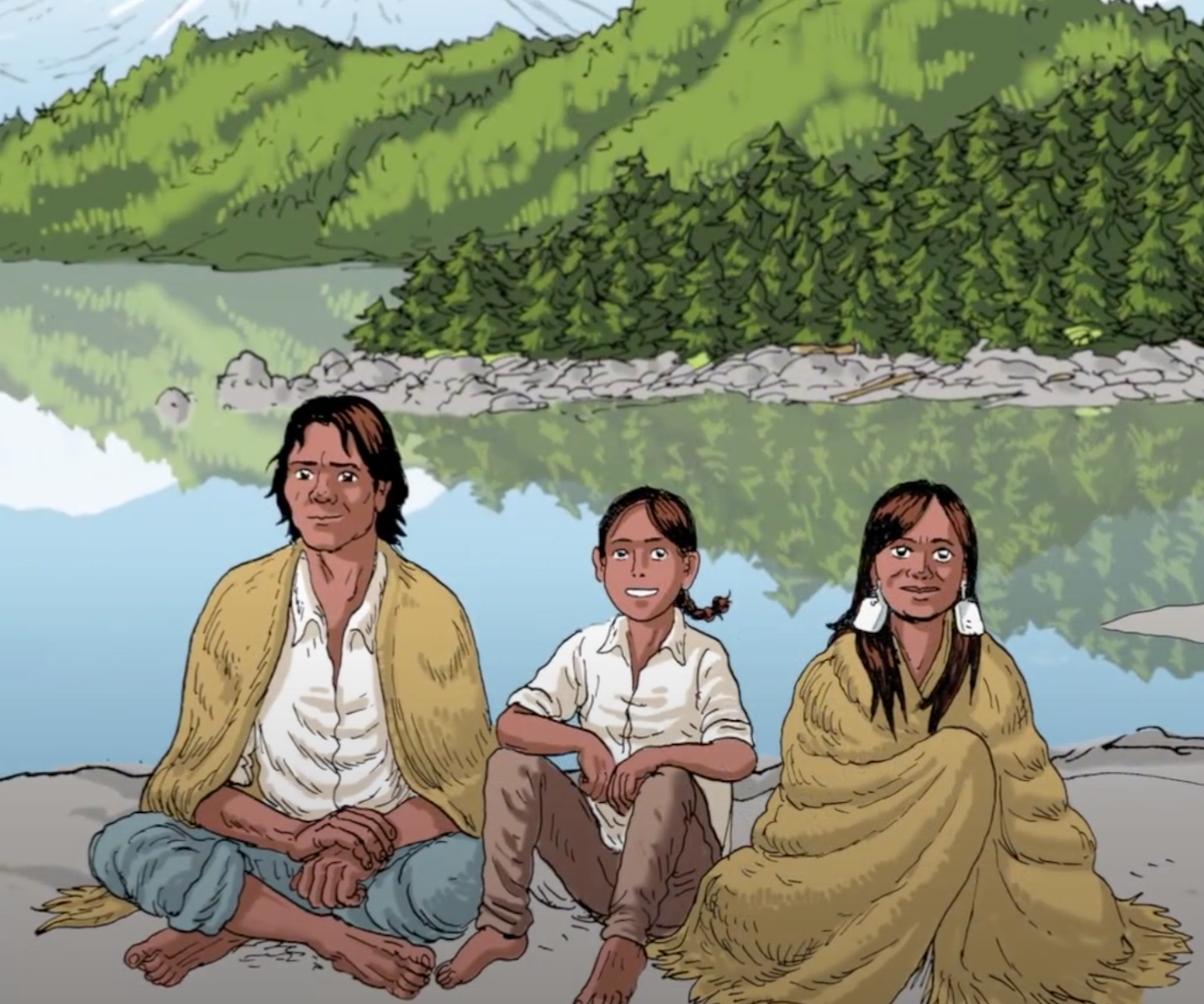
Chen íchnexw nilh ḵex̲ sts'ukw'i7 ch'it ta estekw' áyalhḵw! Múẏaẏi chat eḵ'ta swítenchet kwáyles natlh.' tsut ta mans ta Etsím Skw'shím̓. Nilh s7a7ú7alh kwis nánam̓ eḵ' ti sts'úḵwi7. Tex̲wlám na stl’i7 kwis ta7lt ta Etsím Skw'shím̓!
“There is a school of salmon by Straight Line Beach. We need to set our net in the morning while the tide is still high,” says Small Number’s father. It is the first time that Small Number will go with his father to catch salmon and he has many questions.
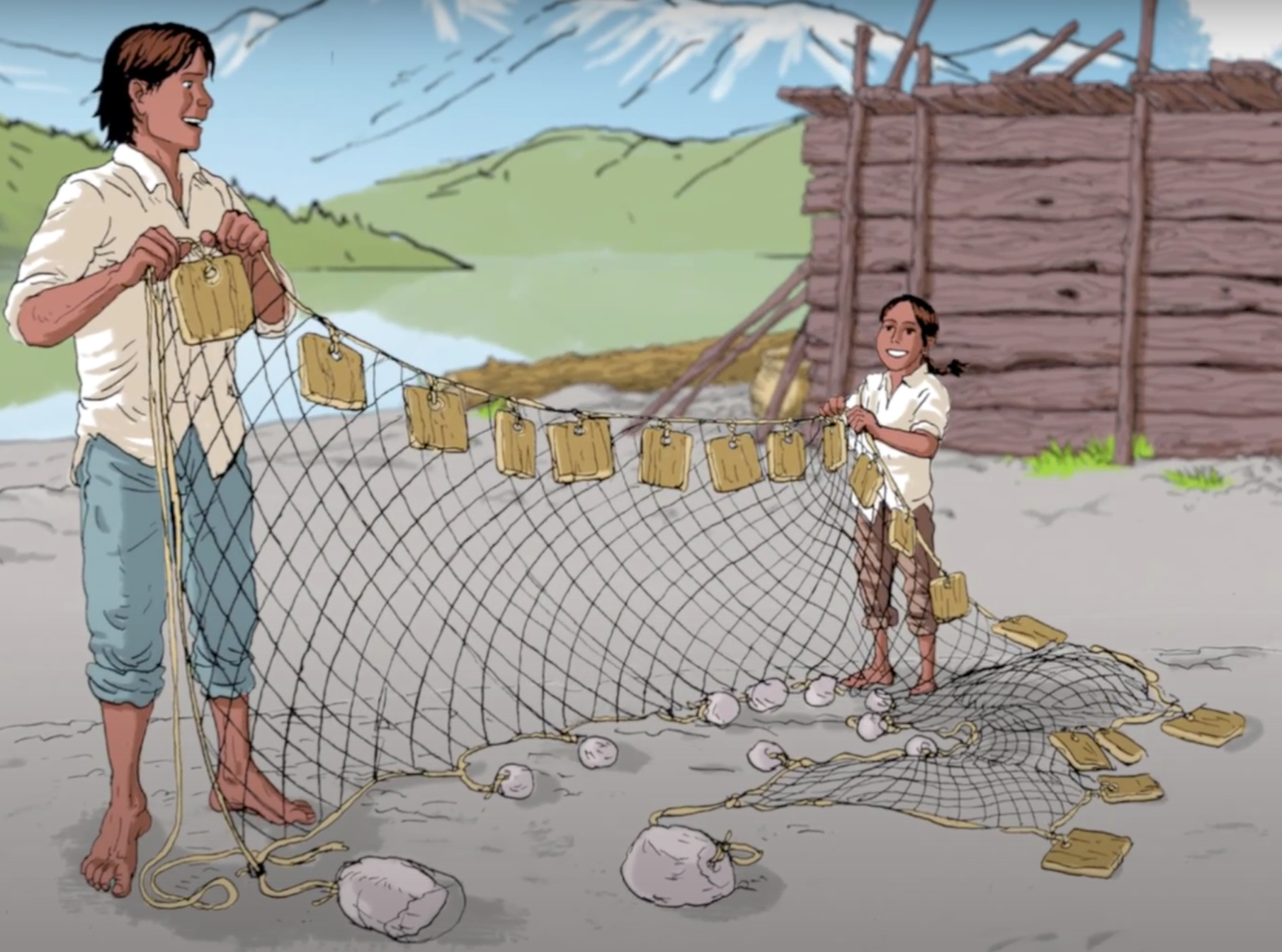
“Shaṅ melh ta smí7mant iy na7 ta ína ta switn ta x̲paẏmiṅ? Shaṅ kwis stl'i7schet tsi áṅus syex̲ás? Kw'in kwi x̲eta7newas? Shaṅ tim̓á wa Ihich' ta x̲paẏ? Txwnch7am̓ tl'aḵt ta switn? Txwnch7am̓ les kwis múẏaẏi ta swíten?”
“Why are these round pebbles on one side and those pieces of cedar on the other side of the net? Why do we need those two big rocks? What is the weight of those pebbles? How far apart are they? Why are the pieces of cedar cut in this shape? How long is the net? How deep is the net?”
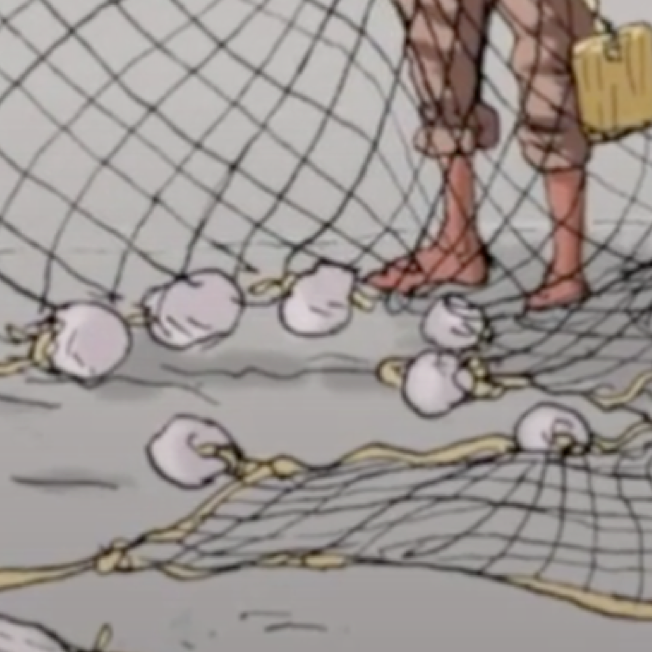
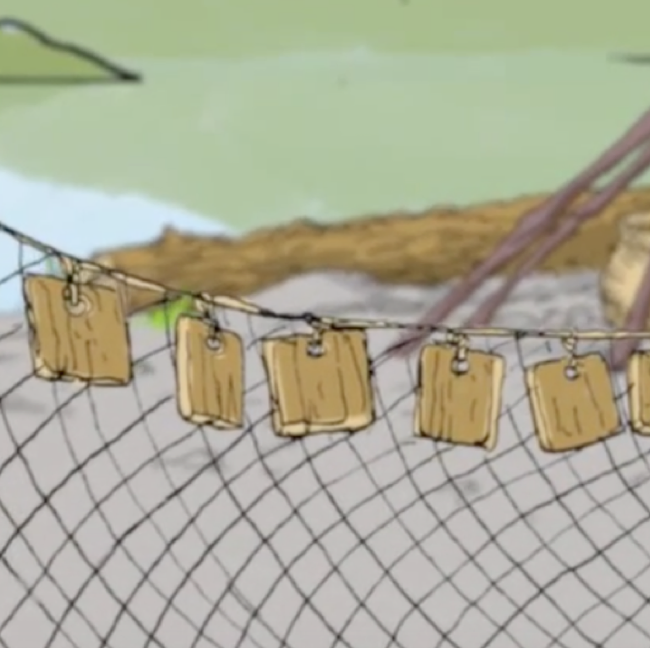
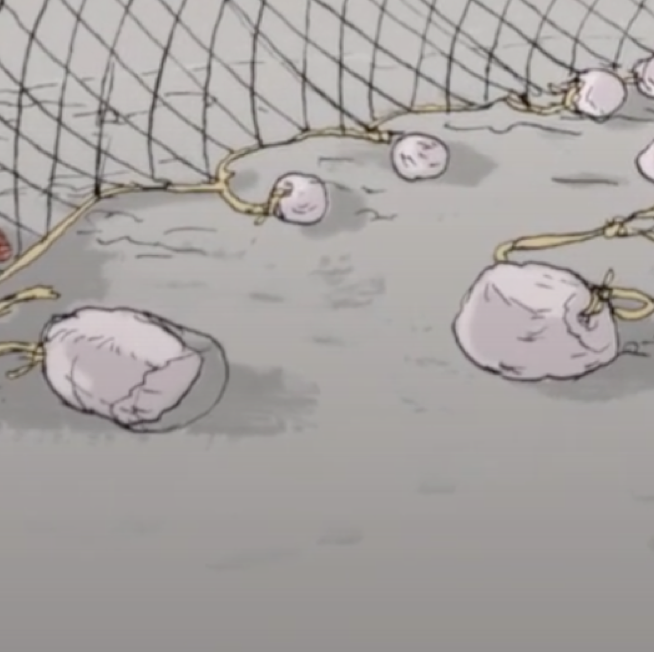
“Úyumen chexw, Etsím Skw'eshím̓! Ta7lt chexw eḵ' kwáyles”, tsut ta mans kwis wes nx̲iyá7ms. “Ts'kw'átsut chexw kwis hánswit chexw a si7l iy a sisí7 es-hilkw ta swíten. Ha7lh ḵ kwis tsixwit ek' yeẇániwilh wa kwákwayel na7 ta áyalhḵw kwáyles natlh!”
“Be patient, Small Number, you will learn all tomorrow,” smiles his father. “Now run and tell your grandfather and your uncle that the net is ready and that they should be at our beach before dawn!”
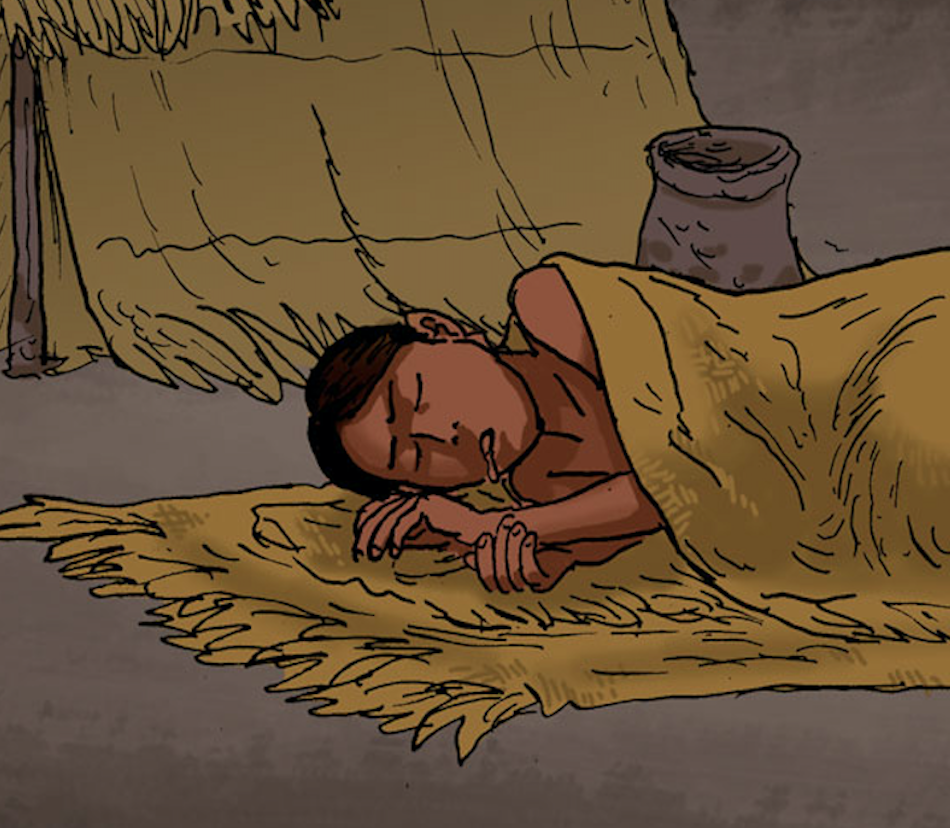
An x̲wá7ilwes kwis nam eḵ' ti sts'úḵwi7 kwa Etsím Skw'eshím̓. An wa tl'i7 kwis mi ítut welh na ítutnumut kwis wes eľéli7nitas ta hiyí sts'úkḵwi7 wa esíxiwat ta staḵw.
Small Number is very excited about his new adventure and when he finally gets to sleep, he dreams about a big salmon jumping out of the water and falling back with a splash.
Na íchnexwas kwis ses ns7alh wa nichim ta chesha7s: “Úmsem chexw Etsím Skw'eshím̓. Na wa na7 s7ulh áyalhḵw a man.”
“Wake up, Small Number. Your dad is already down at our beach,” Small Number hears his mom’s gentle voice.
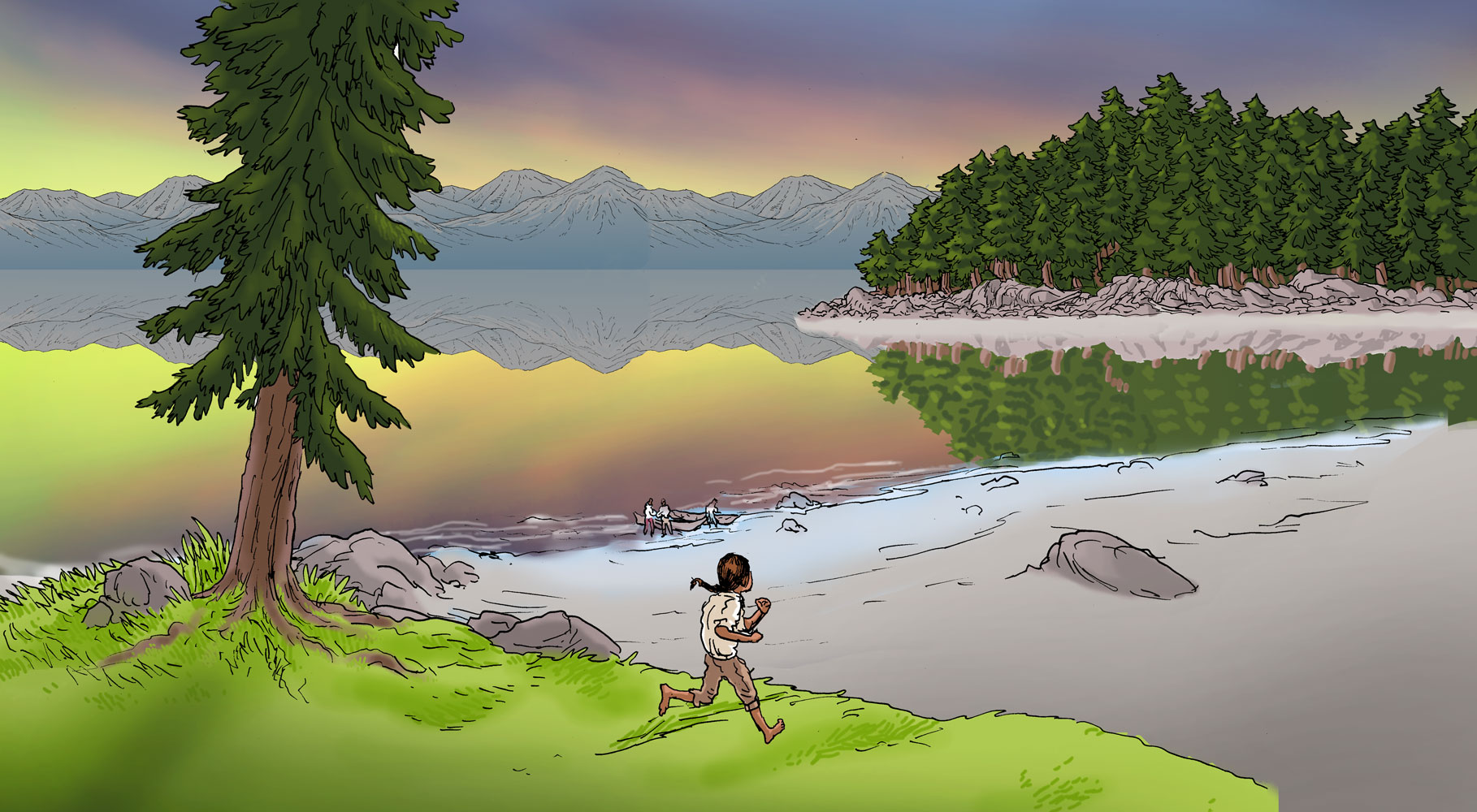
Na tl'iya kwis ses nam tkwi ats'ḵ. Waitímusem. Txwnam ta sútich na kw'áchnexwas Ihach ta smenmánit iy nekw íchnexwas wa x̲aam ta ḵw'iyitḵ iy ta yúyakw.
When he steps outside, Small Number stops and looks around. He sees dark sharp peaks of mountains to the north and hears the sound of waves and the squawks of seagulls.
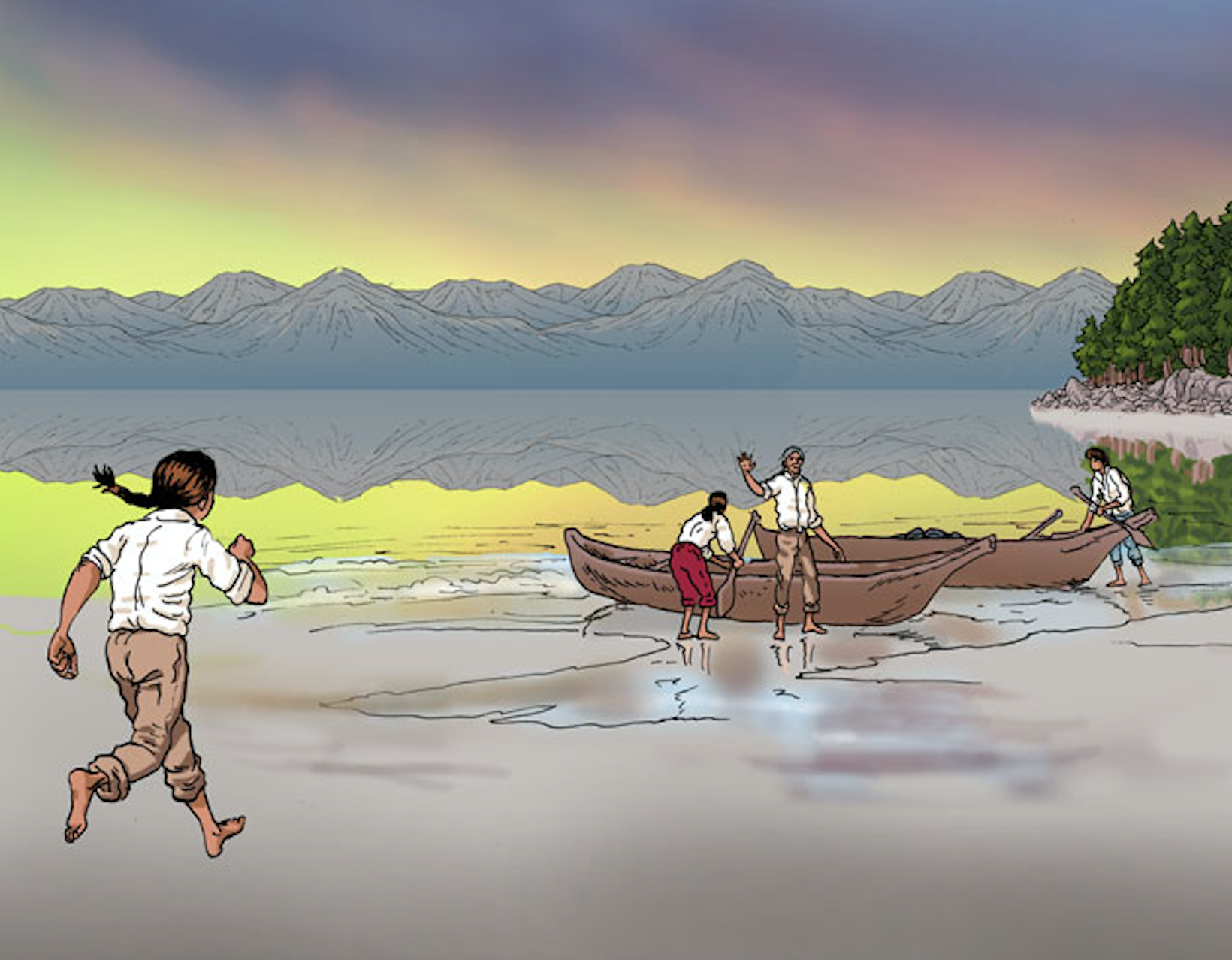
Na ta áyalhkw na kw'áchnexwas esḵéḵxw kwi siiẇí7ḵa. Awíts kwis tsetskw'átsut txwnam̓wit. “I chexw tl’iḵ Etsím Skw'eshím̓,” tsut ta si7ls kwis wes ḵatúseṅtm. “Es-hílkw chat!”. “Na wa úyulhs ta snexwílhschet i7x̲w ta swítenschet iy ta ts'ú7mayshnchet.”
Down on the beach, Small Number sees a group of men and starts running towards them as fast as he can. “Just on time, Small Number,” says his grandfather hugging him. “Our canoes are loaded with nets and baskets and we are ready to go.”
Na melh men tsíxw-wit na7 ta Esteḵw' Áyalhḵw na tsékwilhwit ta si7ls iy ta sisi7s. Etsím Skw'eshím̓ iy ta ta mans men iy iẏáẏulh ta snexwílhswit. Na melh men sátaṅ ta kw'uykwéİshen t ta Si7i. Ses men ísun huyá7 ta áyalhḵw ta snexwílhs ta Etsím Skw'eshím̓ iy wa múẏaẏi ta mans.
When they arrive at Straight Line Beach, Small Number’s grandpa and uncle pull their canoe out of the water. Small Number and his father stay in their canoe and pass the ends of the net lines to Grandfather. Small Number paddles away from the beach while his dad continues to pay out the net lines.
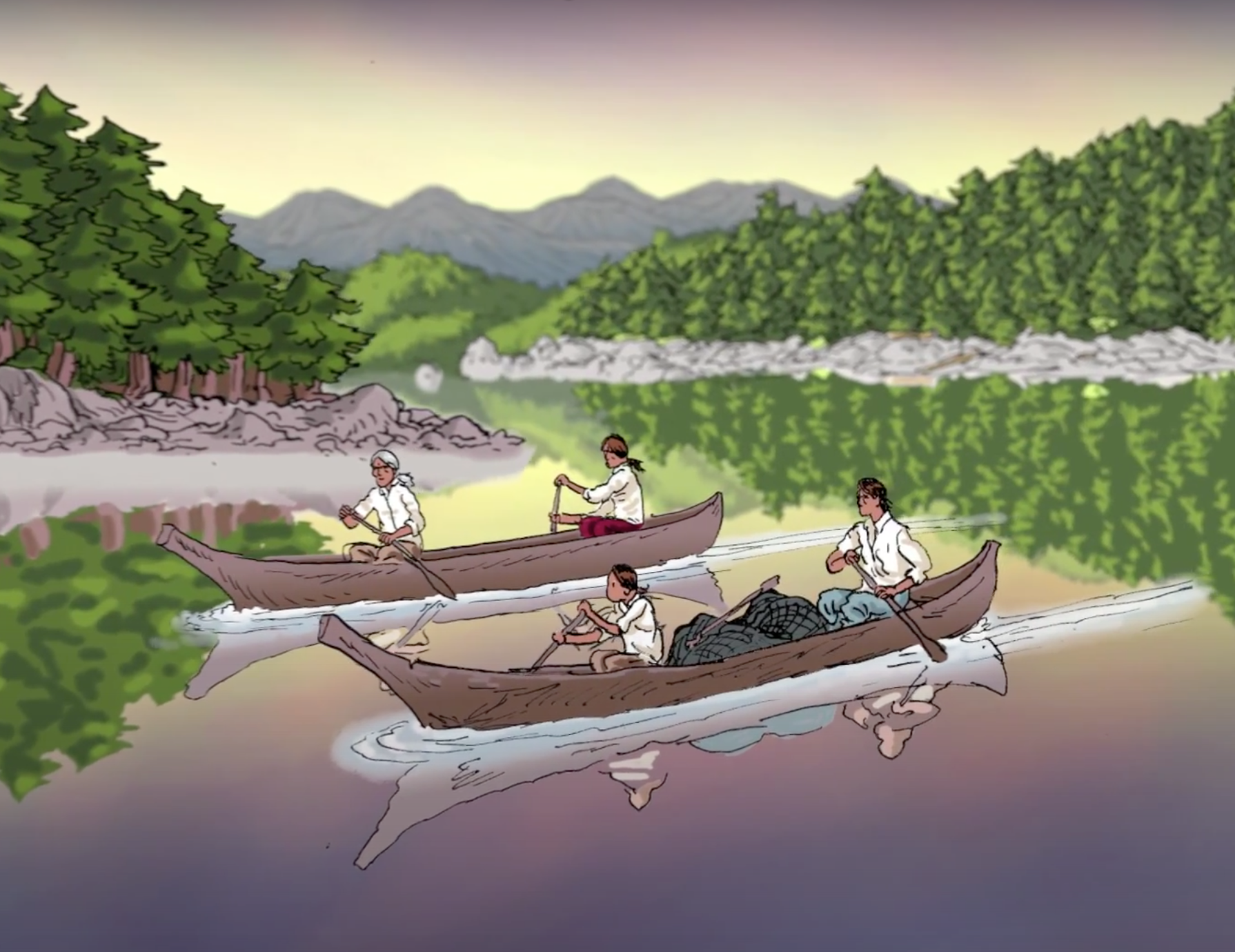
Ses men tsíxwntaswit ta s7a7ú7 p'ekwtín na tim̓áḵsemwit ta snexwílhswit tim̓áwit kwis wa tá7lemswit tta áyalhḵw. Na melh men tséxwstas peymán ta mans ta syex̲ás wa ḵ'ísintas ta swítenswit. Na hans ta Etsím Skw'eshím̓ “Nekw lhḵéṅten ta switen i tti.” “Ahh! Chen yeẇíṅts!” wa kwachem Etsím Skw'eshím̓, “Nilh kwetsi smí7mant na7 t ta smiyíẇax̲ans ta swíten wa itl'is na ta sles. ly kwétsi x̲paẏmiṅ wa p'áp'ekw na ta smiyíwax̲an ta swíten na p'ákwaṅtsut.”
When they reach the beginning of the net, they turn the canoe parallel to the beach and dad throws a big rock that is attached to the net into the water. “This anchor will hold the net in place,” he says to Small Number. “Oh, I see,” yells Small Number, “the pebbles will keep one edge of the net on the bottom and the pieces of cedar will float and keep the other edge of the net on the surface!”
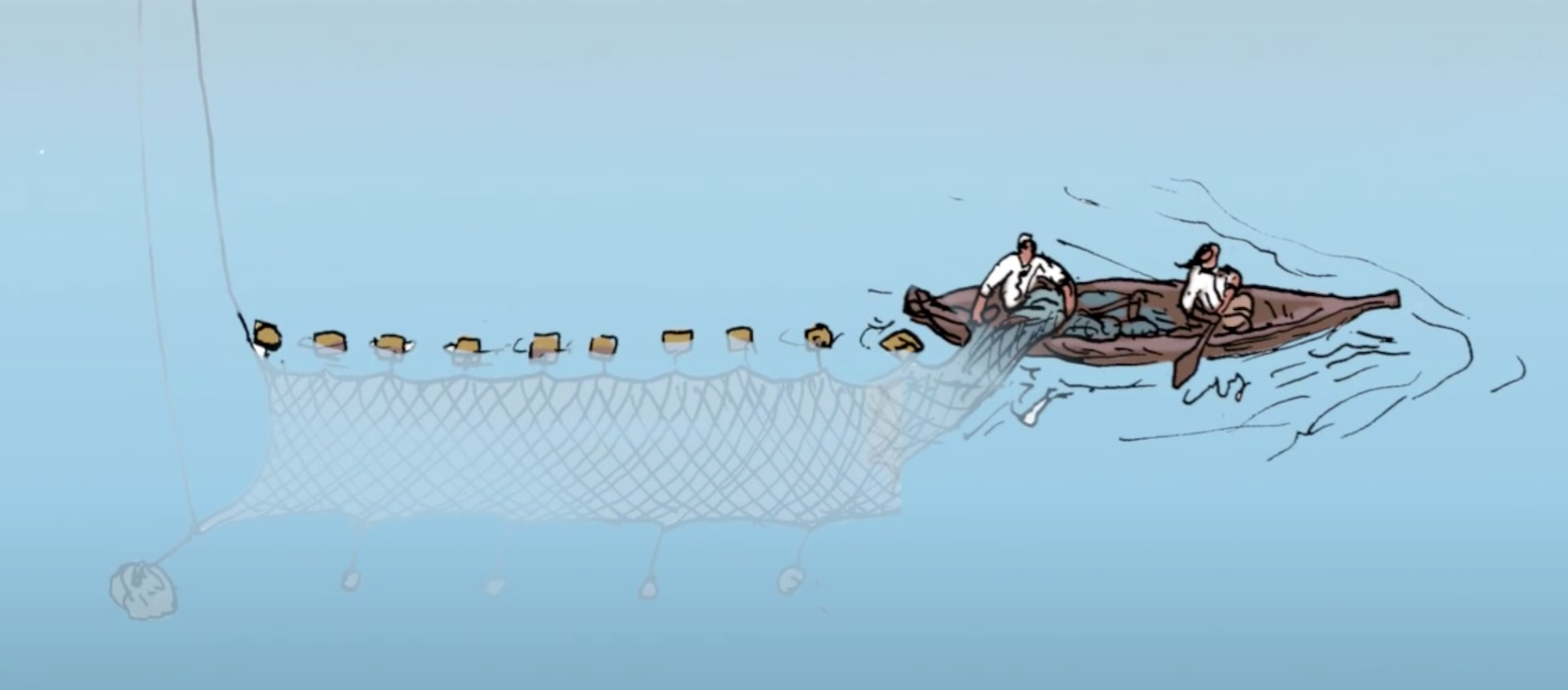
Na kw'áchnexw ḵex̲ esḵéḵxw sts'ukwi wa seyx̲ mi ḵwúlayus. Ses men kw'ácht ta ha7lh sts'úḵwi7 an mi awíts ta tsáli7s. “An kilus iyim ta sts'úkwi!”
Small Number sees how a large group of salmon have drifted inshore with the incoming tide. He looks at their large smooth bodies and feels his heartbeat fasten. “How strong and beautiful these fish are!”
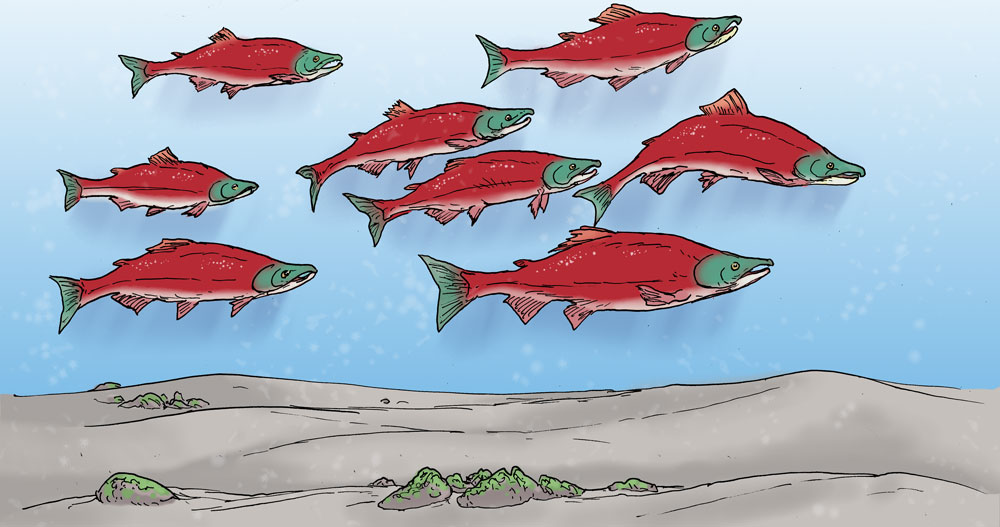
Ses men tim̓áḵsem ta snexwílh ta Etsím Skw'eshím̓ tim̓á kwis ta7ḵsáms ta áyalhḵw k'as wa Ihkentntm ta switn. Na melh men t sátan tta sisi7 tl'a Etsím Skw'eshím̓ ta hiẇstn.
The anchor secures the other end of the net and Small Number turns the canoe towards the beach where his dad passes the net lines to Small Number’s uncle.
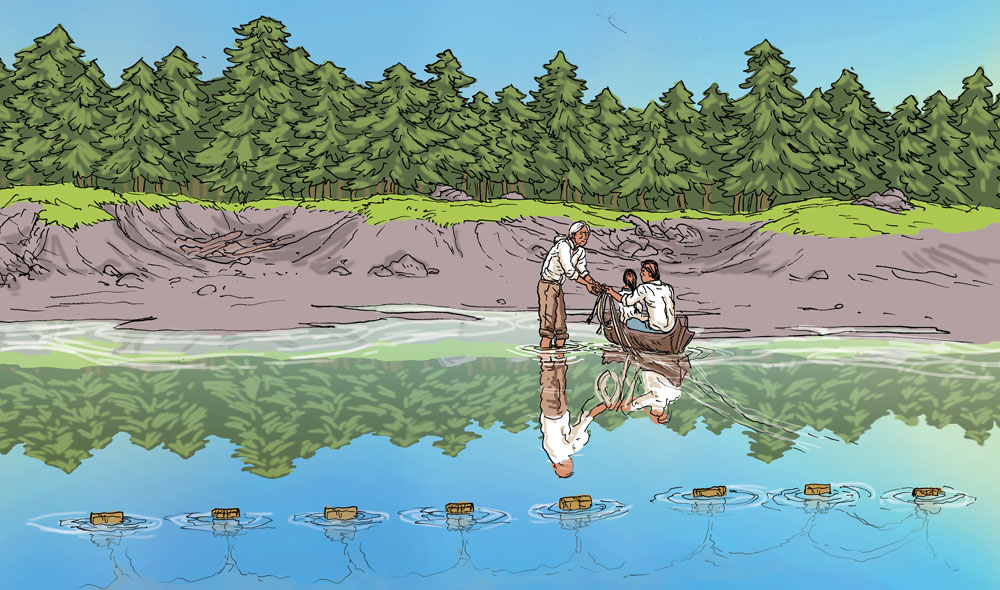

Na melh men tsékwilh ta mans wa welḵw'áls ta Etsím Skw'eshím̓: “Kw'in kwi sts'úḵwi na ḵéxwentat ti sts'is? Txwn7cham̓ kwis cháchshaẏchet tta s7eḵwítelschet? Nilh u tl'am kwi i7x̲w swat? Eslhḵ'i7s u chet kwi ḵ'anátsutwit ta sts'úḵw’i?”
While his dad pulls the canoe out of water, Small Number asks, “How many salmon will we catch today? How are we going to divide the salmon among our families? Will there be enough for everybody? How do we know that the salmon will come back?”
“Tim̓á tkwetsi,” ntélktas ta mans. “I chexw melh itl'iy itti kwis ch'áwat chexw wa xwúkwaẏi a sisi7. Nam̓ chen ch'áwat ta a si7l.”
“We have our ways,” answers his father. “Now, you stay here to help your uncle pull on the net lines. I’m going to help grandpa.”
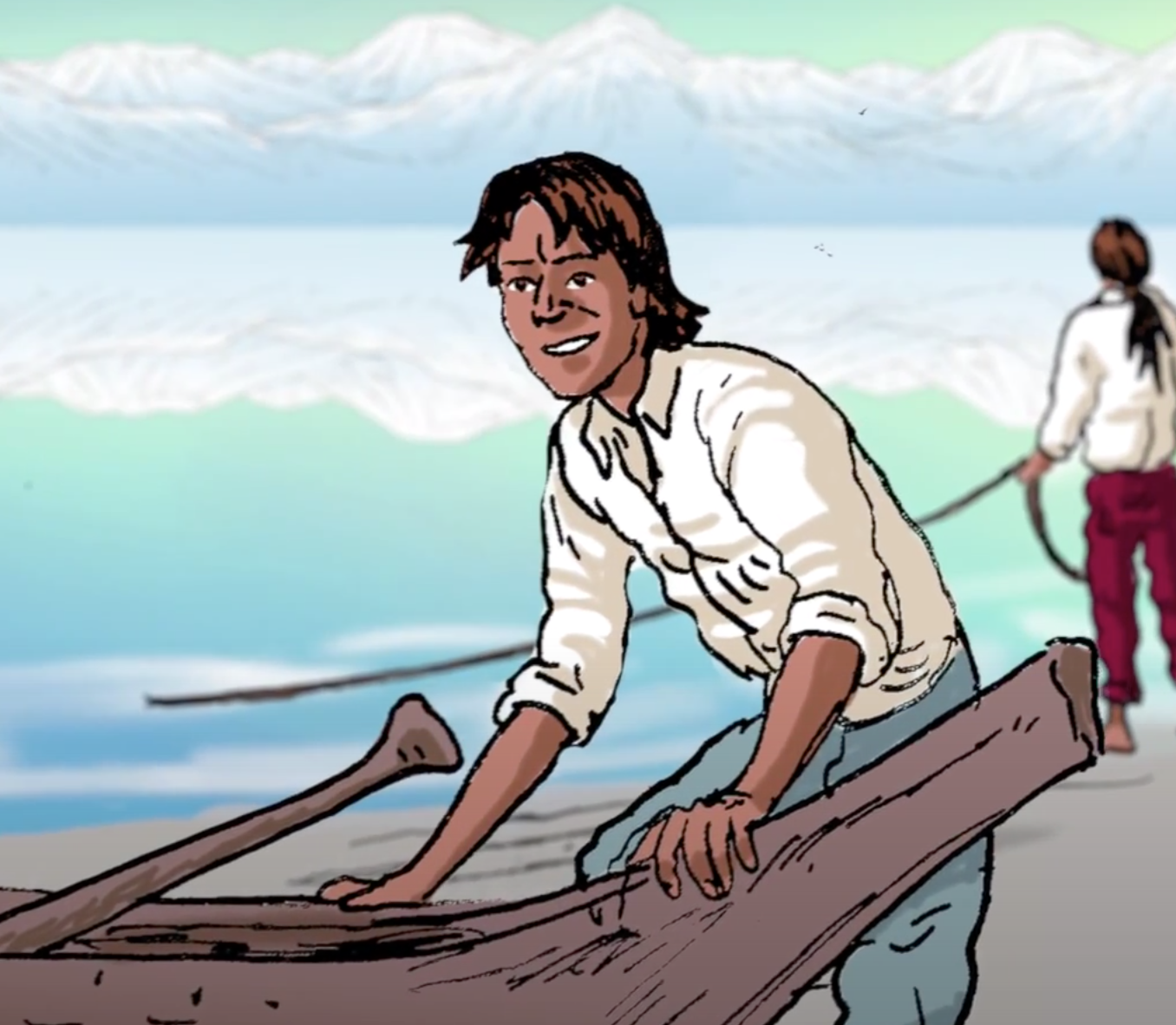
Na p'iḵsimwit kwis xwúkw'aẏiwit. Na kw'áchnexwas ta Etsím Skw'eshím̓ i7xw na sts'ekwts'úḵw'i7 esṅíẇ ta áyalhḵw iy ta switn. Ses men txwtsut ta sisí7s, “Ha7lh kwis mi chet na ḵwúlaẏus. Esḵw’ay kwis ḵéxwen i7x̲w ti sts'úḵw'l na7 ta sham. Tim̓á tkwetsi!”
They start hauling in the net. Small Number sees that all fish within the area between the beach and the net are captured and says to his uncle, “Good that we came during the high tide. If the tide were low we wouldn’t catch this many fish. Our ways are good!”
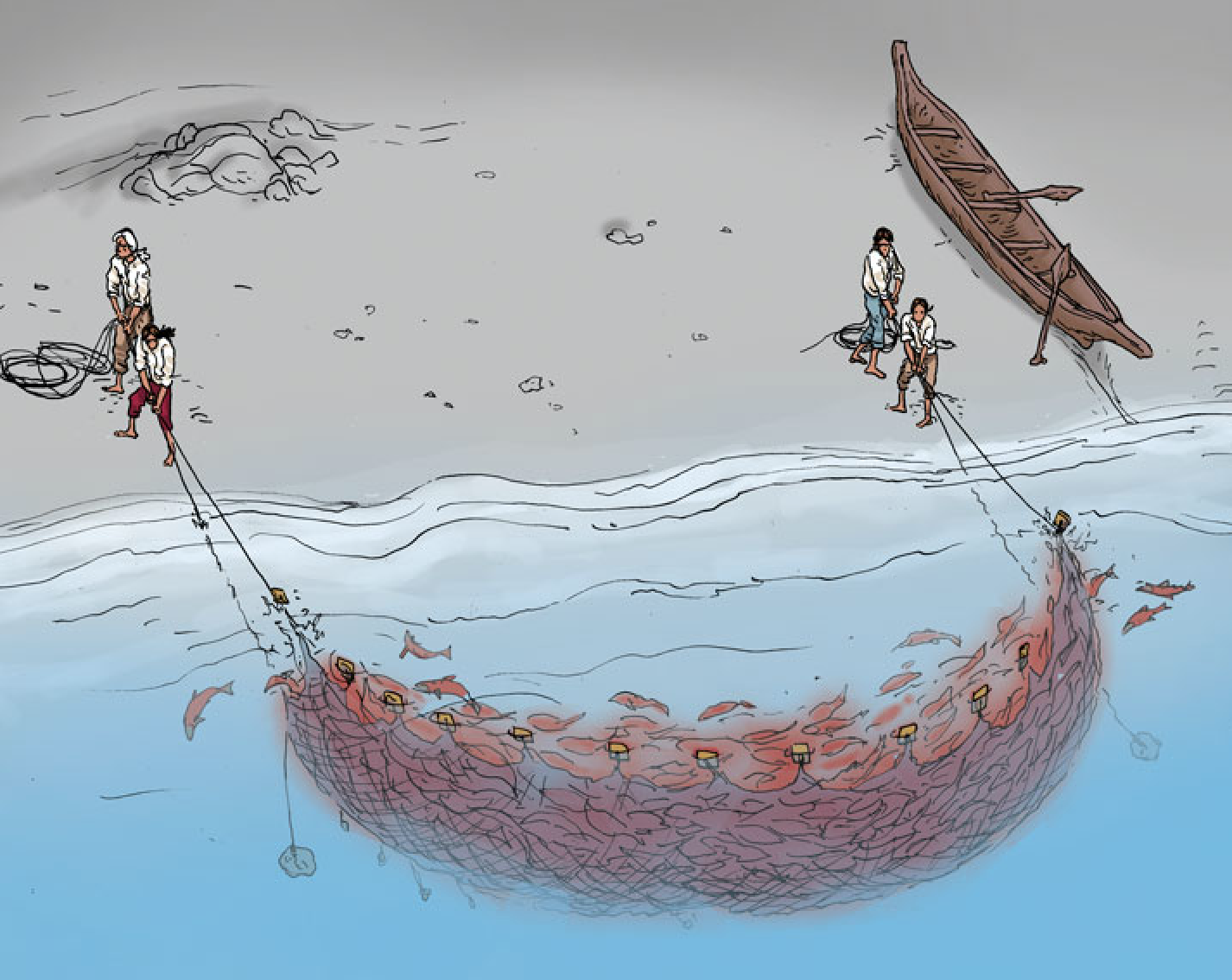
Swelḵw'áls: Shaṅ melh kwelkwálwn ta Etsím Skw'eshím̓ men huy kw'in kwis sts'eḵwts'úḵwi7 wa sham?
Question: Why did Small Number think that during a low tide the catch would be much smaller?
